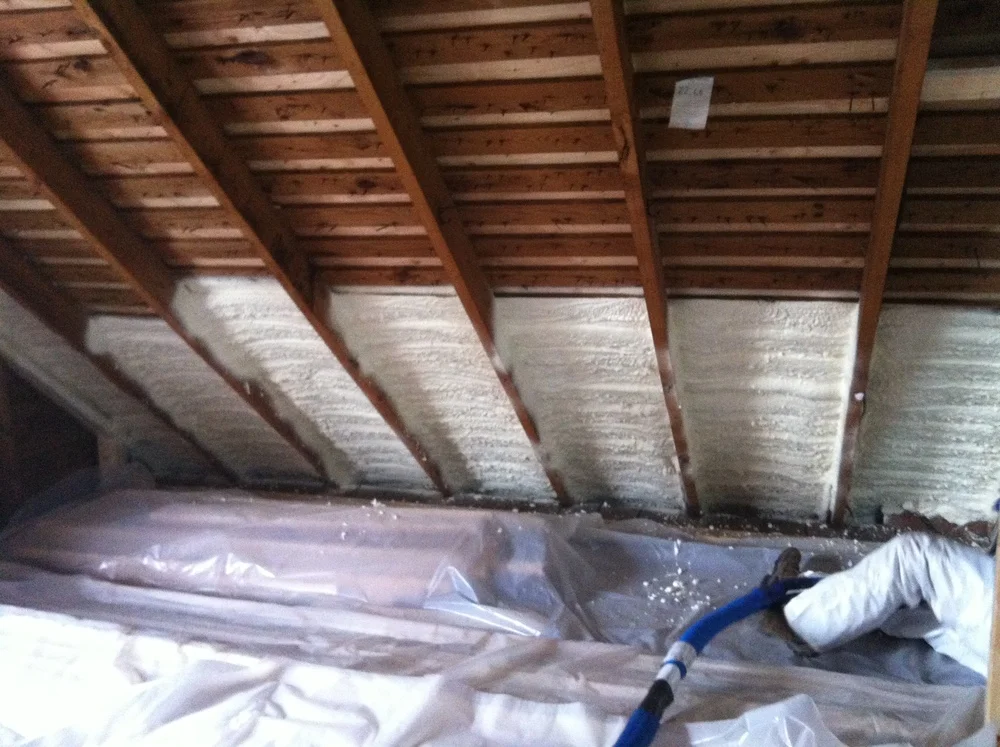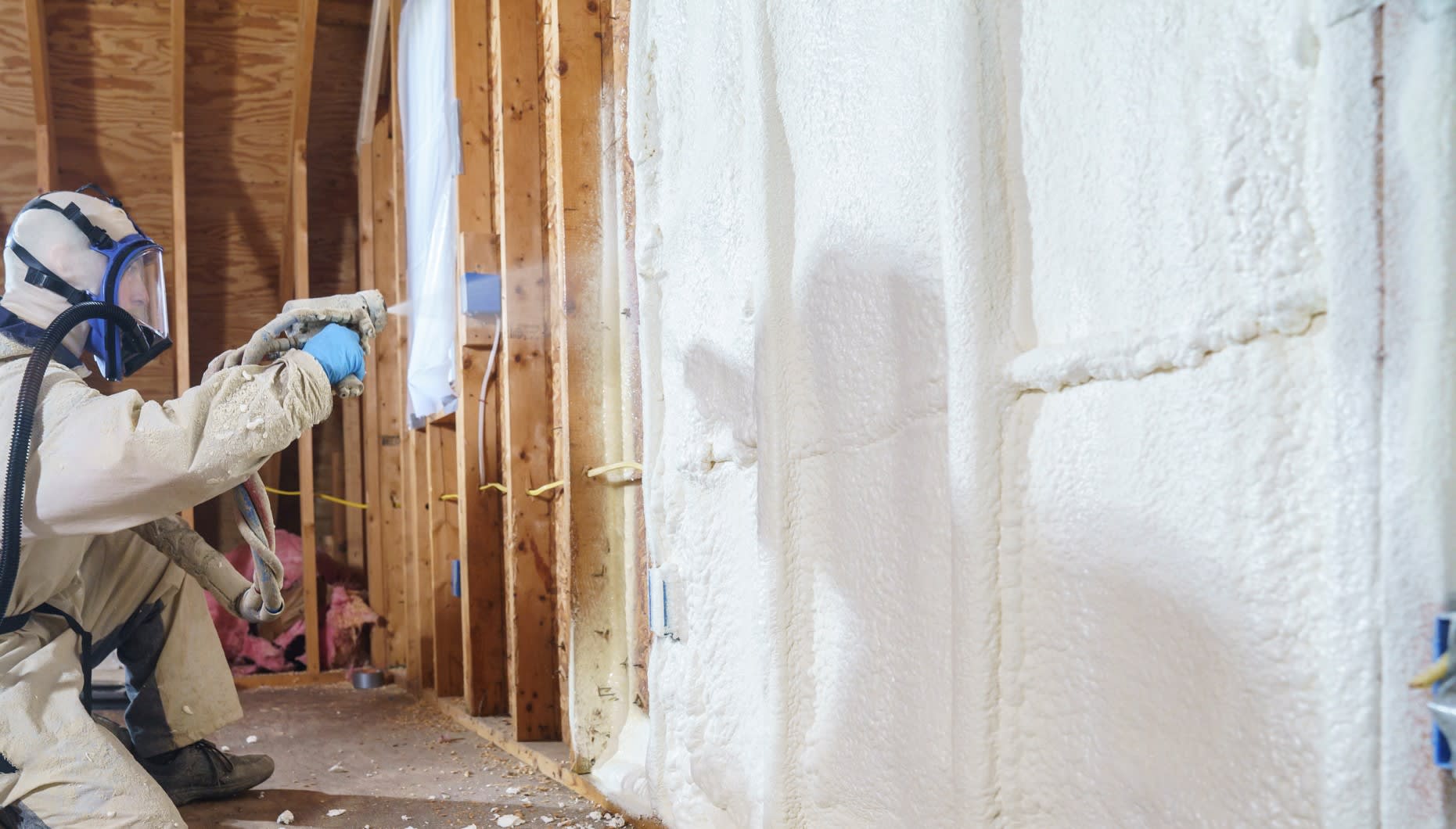Picking the Right Type of Spray Foam for Your Insulation Requirements
Picking the Right Type of Spray Foam for Your Insulation Requirements
Blog Article
Spray Foam: The Ultimate Service for Air Sealing and Insulation
Spray foam insulation has actually become a leading service for reliable air sealing and thermal insulation, providing an one-of-a-kind combination of homes that establish it apart from conventional approaches. Its capacity to expand and fill up voids makes it particularly effective in stopping air leak, which can significantly affect power performance. However, comprehending the complete extent of its advantages, installation processes, and comparisons with other insulation kinds is critical for making informed decisions. As we discover these facets, the effects for both brand-new building and constructions and retrofits come to be significantly substantial. What aspects should affect your selection?
What Is Spray Foam?
Spray foam is a flexible insulation material that incorporates the concepts of air sealing and thermal resistance to enhance power effectiveness in buildings. Made up mainly of polyurethane or other comparable compounds, spray foam is used as a fluid that expands upon call with surface areas, creating a strong, constant layer of insulation. This distinct building enables it to fill gaps, splits, and spaces that traditional insulation products may overlook, giving a remarkable air seal.
There are two major sorts of spray foam: open-cell and closed-cell. Open-cell spray foam is lighter and more versatile, providing excellent sound absorption and a lower R-value per inch - Spray Foam. On the other hand, closed-cell spray foam is denser, offering a higher R-value, wetness resistance, and added architectural honesty to building parts
The application process generally entails specific tools, making sure a seamless application that follows numerous substrates, consisting of concrete, metal, and wood. This flexibility makes spray foam appropriate for both brand-new buildings and retrofitting existing structures. Its capacity to create a closed obstacle substantially adds to minimizing energy consumption and improving indoor air top quality, thereby making it a preferred option amongst property owners and home builders alike.
Advantages of Spray Foam Insulation
One of the most considerable benefits of spray foam insulation is its extraordinary capacity to produce a constant air obstacle, which efficiently reduces power loss. Unlike typical insulation products, spray foam increases to load voids and splits, ensuring that air leak is significantly decreased. This characteristic not only enhances power performance yet additionally causes reduce utility bills over time.
Additionally, spray foam insulation provides superior thermal resistance, adding to an extra steady indoor environment. Its high R-value per inch permits reliable insulation in constrained areas, making it optimal for attics, walls, and crawl rooms. In addition, the moisture-resistant residential or commercial properties of spray foam help protect against mold and mildew and mildew growth, advertising much healthier living conditions.
One more crucial advantage of spray foam insulation is its sound-dampening top qualities (Spray Foam). It efficiently reduces sound transmission between rooms, developing a quieter and extra comfy home environment. The durability of spray foam additionally sticks out, as it does not sag or resolve gradually, preserving its efficiency throughout its life expectancy
How Spray Foam Functions
Understanding just how spray foam insulation functions is important for appreciating its efficiency in air sealing and thermal resistance. Spray foam insulation includes two primary parts: isocyanate and polyol resin. When these parts are mixed, they undertake a chemical response that causes the product to expand swiftly, producing a dense foam that fills cavities, cracks, and voids.
As the foam increases, it complies with surfaces, creating an airtight seal that considerably lowers air seepage. This particular makes spray foam insulation highly reliable at protecting against drafts and dampness penetration, which can cause energy loss and damages gradually. Furthermore, the closed-cell variant of spray foam supplies superior thermal resistance due to its stiff framework, effectively decreasing additional hints warm transfer.
The special buildings of spray foam allow it to adapt irregular surfaces, guaranteeing extensive protection and a seamless barrier. Because of this, spray foam insulation not only boosts power performance yet additionally adds to enhanced indoor air high quality by decreasing the accumulation of toxins and irritants. Eventually, comprehending the auto mechanics behind spray foam highlights its function as an exceptional option for insulation and air sealing in both domestic and commercial applications.
Installment Refine Summary

Before installment, the space must be appropriately cleansed and prepped, guaranteeing that surface areas are without dust, particles, and dampness. Due to the fact that impurities can compromise adhesion and overall performance, this step is important. As soon as the location is prepared, the application entails blending the two components of the spray foam, which broadens upon get in touch with and fills up gaps effectively.
Trained specialists ought to conduct the installment, making use of specific equipment to ensure consistent insurance coverage and optimum thickness. Safety and security preventative measures, consisting of putting on safety equipment and making sure appropriate ventilation, are imperative throughout this procedure. After application, the foam commonly treatments promptly, developing a solid barrier important source that enhances power performance.
Contrasting Spray Foam to Standard Insulation
When assessing insulation options, spray foam insulation stands out in contrast to conventional products such as fiberglass and cellulose. Unlike fiberglass and cellulose, which can enable air infiltration, spray foam increases upon application, filling up gaps and holes to produce an airtight seal.
In addition, spray foam offers a higher R-value per inch than standard insulation types, using more efficient thermal resistance in a thinner profile. This particular is particularly beneficial precede with limited dental caries depth. Moreover, spray foam is resistant to wetness and mold and mildew growth, which can be a considerable interest in cellulose and fiberglass, especially in moist atmospheres.
Nevertheless, spray foam insulation generally brings a greater upfront expense than its traditional counterparts. House owners must evaluate this preliminary financial investment versus long-term power savings and performance advantages. Inevitably, while both insulation kinds offer their purpose, spray foam becomes a much more innovative solution for modern insulation needs, especially in terms of air sealing and thermal effectiveness.

Final Thought
In recap, spray foam insulation represents an extremely reliable service for accomplishing ideal air sealing and thermal resistance. Its distinct residential properties, consisting of wetness resistance and noise dampening, make it appropriate for various applications in both new constructions and retrofitting projects (Spray Foam). Although the first prices might be higher compared to traditional insulation products, the lasting benefits, such as significant energy financial savings and boosted indoor air quality, justify the financial investment and highlight its value in modern structure methods.
Spray foam insulation has arised as a leading service for reliable air securing and thermal insulation, offering an one-of-a-kind combination of residential or commercial properties that establish it apart from standard methods.Spray foam is a functional insulation material that incorporates the principles of air securing and thermal resistance to enhance power efficiency in structures.When assessing insulation options, spray foam insulation stands out in contrast to traditional products such as fiberglass and cellulose. Ultimately, while both insulation kinds offer their function, spray foam arises as a more innovative service for modern-day insulation needs, especially in terms of air securing and thermal effectiveness.
In recap, spray foam insulation represents a very effective service for achieving ideal air securing and thermal resistance.
Report this page